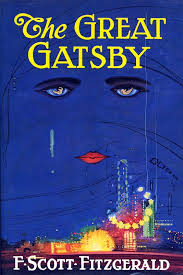
by: F. Scott Fitzgerald
I’m really excited for the new movie coming out! I read The Great Gatsby in high school but didn’t retain much so it was the perfect excuse to reread it. Instead of actually rereading it I listened to the audiobook that Anthony Heald narrated so well.
If you’ve never read The Great Gatsby, it’s an American classic set in the Roaring Twenties. Nick Carraway, our narrator, tells of the summer he went to New York to become a businessman. There, he meets up with Tom, a former classmate at Yale, and Daisy, Tom’s wife and Nick’s second cousin, a couple of leisure. He lives next door to one J. Gatsby, millionaire and man extraordinaire.
Upon my “reread” I’ve changed my opinion of the novel. I think, in fact, that I – not exactly like – but perhaps appreciate this book.
Thematically, I have a very hard time dealing with the novel. “Daisy and Tom are careless people.” Fitzgerald writes, and of all things that are cruel or hurtful, carelessness is the one I have the hardest time understanding. I can comprehend a person driven by malice, blinded by emotion, or unable to see the consequences of their actions. But hurting another through carelessness – not by intent or some unfortunate inability to learn – that’s something I cannot easily grasp. To be so careless takes a willful rejection of something essential to humanity, though what that is, exactly, I couldn’t articulate. It seems so utterly alien to me, that such a person could exist; it creates a disconnect with the novel.
Oh, well, I suppose everyone has characters or themes they cannot connect with, even in the greatest of literature. Fitzgerald is a brilliant author, however, and his characters are beautifully complete. Gatsby is one of the most wholly human characters I’ve ever encountered in fiction. He is by turns magnificent and pathetic, both buoyed up and deceived by a type of hope intimately related to the notion of being American; something akin to, or perhaps part of, the American dream.
Nick, the narrator, is searching for something, though I’m not sure even he knows what. He undergoes a type of disillusionment that, I think, is rather common to the middle and upper middle class, especially for recent college graduates. One of the nuances I missed in high school was how he changed from a passive character idly reflecting the values and social notions he’s been taught to an active character acting upon his own observations. Best of all, he does this by actively living, rather than spending long periods of time in deep introspection or self-examination. Even though the novel is first-person, it is never about Nick’s involvement with himself.
I’m no expert on the Roaring Twenties, but I rather think Fitzgerald’s caught the feel of a society high on life and winning the war. The ease in which the war is mentioned, the complete lack of gravity shown towards the veterans, is one of the most notable differences in their time and ours. It would be hard for an author in today’s society to write about a soldier without attaching some charged notion of heroism or the banality of war. And yet, Fitzgerald only casually mentions the veteran status of Nick and Gatsby; without any fuss he notes simply that Nick feels Midwestern society unexciting after the thrill of WWI. And Gatsby’s war heroics simply add to his appeal rather than being a separate status symbol.
Fitzgerald’s writing is elegant and understated. There’s tons of symbolism, if that’s your thing, and thematically the novel is rich. Much of it applies to American society today. Most of the classics I read are European in origin and don’t apply in the same ways; it was oddly fulfilling to read something direct specifically at Americans. The book is also short and easy to read, so if you’re on a time or energy budget, fear not this novel!
I recommend this to anyone who likes American classics, the Roaring Twenties, great literature, or simply a good story that feels meaningful without being preachy. If you love your happy endings, though, or want everyone to learn their lesson, you may want to give this one a pass.
Side note: I’m so excited about Leonardo DiCaprio playing Gatsby; I think he’s perfect for the part! And Baz Luhrmann is one of my favorite directors; I cannot wait to see how he does the Roaring Twenties. I only wish Amy Adams was playing Daisy; I think her artless charm – anyone seen Miss Pettigrew Lives for a Day? – would be the crowing touch of the film.
Wow! Long post! But if you made it all the way through and have a thought on the book or the movie or the casting, drop a line in the comments!

